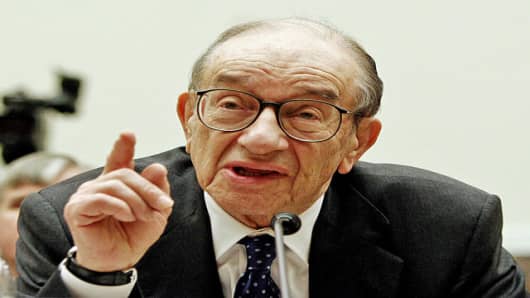ENGLEWOOD CLIFFS, N.J., September 17, 2007-The Federal Reserve tried to curb the explosive growth in the U.S. housing sector under Alan Greenspan's tenure, but each time it tried to raise long-term interest rates it failed, the former Fed chief told CNBC's Senior Economics Reporter Steve Liesman in an interview.
Liesman also spoke with Greenspan about the possibility of a recession, slower growth and higher inflation, and the Fed being too tight.
Following are excerpts of Liesman's interview, which will air throughout the day today, Monday, September 17 on CNBC, First in Business Worldwide:
ON RECESSION:
GREENSPAN:
I think the-- the risks are probably, obviously, larger now than back then. But not a great deal.
In other words, most forecasts who were experienced-- modelers and forecasters and the most knowledgeable-- have not yet come to the point of forecasting a recession. They invariably have lower rates of growth. And when you get down to the low rates of growth that some of them have, it's an interesting question of whether they're stable.
LIESMAN:
Are you concerned we're at or near stall speed right now?
ALAN GREENSPAN:
We're not there yet. No. But-- we very likely could get there.
LIESMAN:
How is the current situation similar to and different from what happened in '87 and '98?
ALAN GREENSPAN:
All three are dominated by-- unchangeable innate characteristic of human nature, fear. And people behave in a very predictable way when caught in the grip of fear. Because whenever you're frightened or uncertain-- a human tendency, which is never capable of being changed or le-- improved by learned in any sense, is to disengage.
Because if you're crossing a street and you don't know if cars are coming or not, you stop. And when you're in the market, when you're not quite certain what is going on, you disengage from the market.
LIESMAN:
In both those cases, Mr. Chairman, you acted very aggressively. The Fed under-- under your stewardship acted very aggressively. It seems to me like-- I mean, do you think there's 50 (UNINTEL) at 25?
ALAN GREENSPAN:
Well-- you know, people are comparing the way the Fed behaved when I was Chairman, in the way when-- currently when Ben Bernanke's chairman, As though they're the same. They're not. I was in the period in which there was this-- we were in the grips of significant long-term disinflation. We did not have to be concerned, terribly much, about inflation.
And, as a result, we had the ability and flexibility if you so chose, to move down without worrying about the-- the significant increases that may occur. It's different now. And it's very clear that the trade offs on inflation and growth are altered. And the Fed has to be far more careful about inflation now, than when I was chairman.


